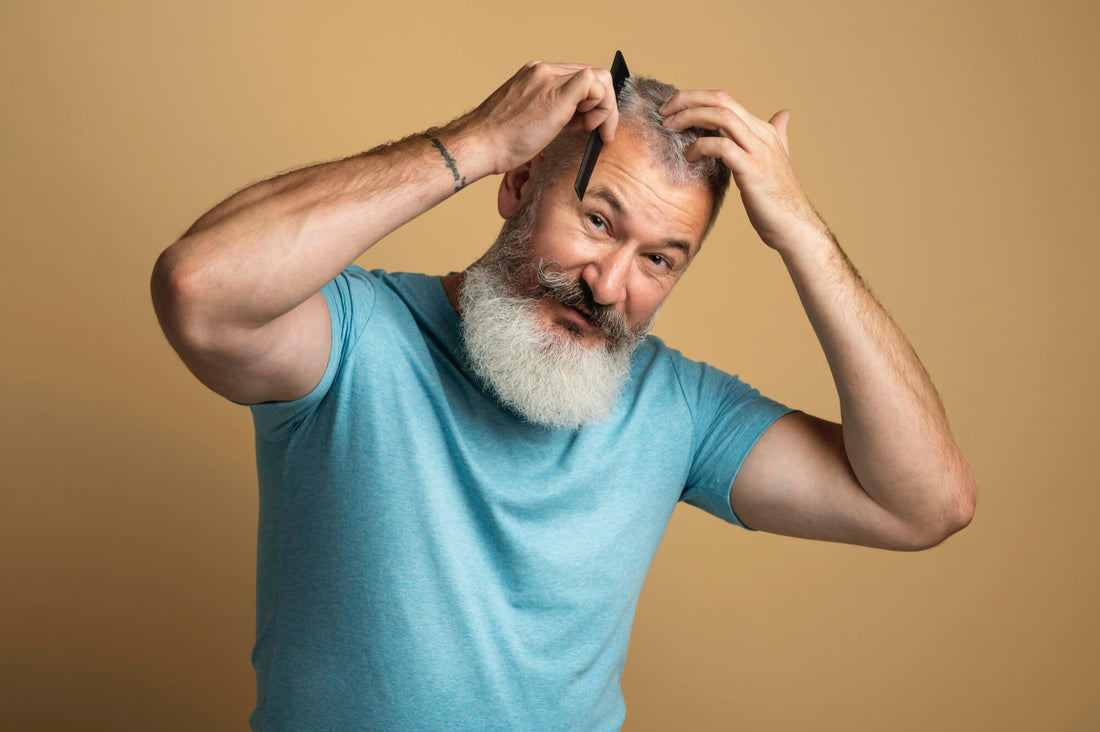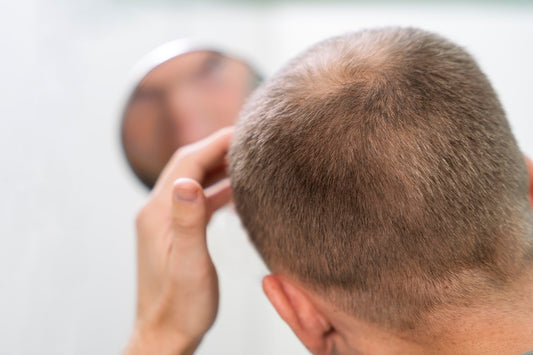Hair loss is a widely prevalent issue that both men and women face today. Although genetics plays a major part in hair loss, another key factor can be stress. Understanding and acknowledging this connection is vital in breaking the cycle.
The Relationship Between Stress and Hair Loss
The intricate connection between our emotional health and our physical appearance can't be overstated. The human body often responds to stress by instigating a series of noticeable physical changes, such as hair loss.

There are several types of hair loss closely associated with high levels of stress:
Telogen Effluvium
- Definition: Telogen effluvium occurs when severe stress pushes a significant number of hair follicles into the resting, or telogen, phase. Subsequently, these hairs begin to shed.
- Symptoms: Sudden hair loss that most often occurs while washing or brushing hair, or even after gentle tugging.
- Recovery: Generally, recovery from telogen effluvium is possible and comes naturally without treatment. Hair typically regrows after the stressful event has passed, although it can take several months.
Trichotillomania
- Definition: Trichotillomania is a stress or anxiety-induced disorder characterized by the inability to resist the urge to pull out hair from the scalp, eyebrows, or other areas of the body.
- Symptoms: Noticeable hair loss, bald patches, and shortened hair or thinned hair in certain areas.
- Treatment: Cognitive-behavioral therapy is often beneficial for managing and overcoming trichotillomania.
Alopecia Areata
- Definition: Alopecia areata is a condition wherein the body's immune system attacks the hair follicles, resulting in hair loss. High levels of stress can trigger this.
- Symptoms: Hair loss and bald patches usually in circular or oval patterns. Hair may grow back and fall out repeatedly.
- Treatment: While there's currently no cure for alopecia areata, some treatments may help hair regrow more quickly and may prevent future hair loss. These include corticosteroids and topical immunotherapy.
In all these cases, controlling stress levels becomes a crucial aspect of managing and overcoming hair loss.
The Science Behind Stress-induced Hair Loss
Understanding the scientific mechanism behind stress-induced hair loss can be the first step towards preventing or rectifying it. Here's a more detailed look at the process:
Understanding Stress Response
When the human body is exposed to elevated levels of stress, it responds by releasing a hormone named adrenaline. This hormone is commonly associated with the body's 'fight or flight' response to urgent situations.
Metabolic Shift and Its Implications
If the body is not able to utilize this adrenaline (i.e., there’s no fleeing or fighting), and stress is persistent, there is a metabolic shift that occurs. The body starts converting surplus adrenaline into cholesterol, which, in turn, raises the body's cholesterol levels.
The Role of Testosterone and DHT
Increased cholesterol levels lead to an increased production of testosterone. Testosterone, a hormone present in both males and females, is then converted into dihydrotestosterone (DHT) as a by-product.
Effect of DHT on Hair Follicles
High levels of DHT can have an adverse effect on hair follicles by causing them to shrink. This shrinkage results in shortened lifespan of hair follicles and a significant reduction in the production of new hair strands, eventually leading to hair thinning or loss.
The Importance of Stress Management
As evident, continuous stress can instigate a chain reaction that may result in hair loss. Therefore, managing stress is not only beneficial for overall emotional and physical health but also crucial to maintain full and healthy hair.
Stress management techniques such as meditation, regular exercise, and seeking professional help when needed are all ways to interrupt and reverse this cycle, aiming to maintain a balance in the body's hormonal environment.
Recognizing Stress-induced Hair Loss: A Closer Look at the Symptoms
Identifying stress-induced hair loss early-on plays a crucial part in mitigating its effects and initiating prompt treatment. Here are the key signs to watch out for:
Sudden Hair Loss
Often, the primary symptom of stress-induced hair loss is a sudden and unexpected clump of hair loss.

You might notice this while running your hands through your hair or even on your pillow when you wake up.
Increment in Hair Fall
Another telling sign could be the noticeable increase in hair fall when you're washing or brushing your hair. A few strands of hair fall during these activities is normal, but a significant increase should not be ignored.
Visible Thinning or Bald Patches
One of the more alarming signs of stress-induced hair loss is visibly thinning hair or the appearance of bald patches. This could apply to any part of your scalp and is a clear symptom of significant hair loss.
Accompanying Behavioral Symptoms
Equally important are the accompanying behavioral symptoms such as sleeplessness, bouts of anxiety, or an increased inability to focus. If the aforementioned physical symptoms are accompanied by these behavioral changes, it could quite likely be a case of stress-induced hair loss.
Remember that the presence of these symptoms does not necessarily mean you have a serious medical condition. Hair loss can be a natural reaction to persistent stress. Ignoring these symptoms or assuming they will go away on their own can potentially exacerbate the situation.
Always consult a healthcare provider to correctly diagnose the cause and devise a suitable treatment plan.
Managing Stress to Prevent Hair Loss
To effectively break the cycle of stress-induced hair loss, it's essential to adopt a multi-faceted approach that targets the root cause and supports overall well-being.
Here, we delve into a more detailed insight on how you can manage stress and promote healthier hair growth.
Stress Management Techniques
Identifying and acknowledging stress is the first step to managing it. Once you recognize the symptoms, incorporate and engage in healthy coping mechanisms that resonate with you. Some proven methods include:
- Regular exercise: Physical activity releases endorphins, which help reduce stress and enhance mood.
- Meditation: Mindfulness techniques like meditation can help relieve stress and promote emotional well-being.
- Deep breathing exercises: Practicing deep breaths throughout the day helps keep the nervous system calm, reducing stress levels.
- Professional therapy: Talking to a therapist or counselor can help you navigate stressful situations and develop coping strategies.
Adequate Nutrition
Stress can lead to poor dietary habits, which in turn can contribute to hair fall. Ensuring that your body receives the necessary nutrients is crucial for maintaining a healthy head of hair.

Focus on a balanced diet that includes:
- Protein: Hair is primarily composed of keratin, a type of protein. Consuming an adequate amount of protein-rich food is essential for hair growth.
- Vitamins: Vitamins, especially biotin (vitamin H), contribute to healthy hair. Include fruits and vegetables in your diet to obtain essential vitamins.
- Minerals: Minerals such as iron, zinc, and selenium play a substantial role in promoting healthy hair. Consume a variety of nuts, seeds, and legumes to ensure sufficient mineral intake.
Sufficient Sleep
High levels of stress can lead to disrupted sleep patterns, causing further hair loss. Sufficient sleep is vital as it allows the body to repair damaged cells and regenerate, thus promoting hair growth. Aim to get 7-9 hours of quality sleep each night.
Proper Hair Care
Taking care of your hair is equally important to prevent unnecessary strain and damage.

Avoid the following practices:
- Tight hairstyles: Steer clear of hairdos that pull tightly on your hair roots, as this can lead to hair loss over time.
- Heat styling tools: Limit the use of hair dryers, curling irons, and straighteners, as excessive heat can damage the hair shaft.
- Harsh chemical products: Opt for gentle hair care products and limit treatments that involve strong chemicals.
- Regular trims: Frequent trimming of hair helps maintain its overall health and minimizes damage caused by split ends.
By adopting these measures and maintaining a holistic approach towards stress management and proper hair care, you can effectively prevent hair loss and promote healthier hair growth.
Support
Sometimes, taking these steps may not be enough, and you may need to seek professional help. Remember that it's okay to ask for help.
Should you notice persistent hair loss despite making lifestyle changes, consult a healthcare provider. They can provide you with suitable treatment options, which may include therapy for stress and anxiety management or medication to reduce hair loss.
Conclusion
Hair loss and stress often go together, but understanding this connection and taking steps to deal with stress can help you break this cycle, leading to healthier hair and a happier you.
Keep in mind that everyone faces stress at times, but how we manage it makes a big difference, both to our hair and overall well-being. Embrace a positive attitude towards stress because a healthy mind leads to healthy hair.
Don't let stress control your life. Be proactive, ask for help when needed, and break free from the effects of stress-induced hair loss.
Searching for an easy way to maintain smooth, full, and strong hair? The Mohebi Life Natural Hair Support Supplement for Men could be your solution. With just one capsule a day, you can unlock the benefits of our science-driven formula.
This supplement blends natural ingredients like saw palmetto and pumpkin seed oil, supported by advanced research, to encourage healthy hair growth and improve overall hair strength. Let Mohebi Life guide you on your journey to hair wellness.
FAQs
What are your signs of stress?
Signs of stress include feelings of constant worry, trouble focusing, sleeping problems, irritability, changes in appetite, rapid heart rate, and physical symptoms like frequent headaches, upset stomach, and increase in hair fall.
How do I stop stressing and losing hair?
To stop stress and hair loss, it's crucial to adopt stress management techniques such as regular exercise, meditation, or yoga. Keeping a nutritious diet, getting enough sleep, and maintaining a regular hair care routine can also help combat hair loss.
Will hair grow back if you lose it from stress?
Yes, hair loss caused by stress is usually temporary, and hair generally grows back once the stress is managed or reduced. However, it can take several months for hair to regrow fully, so patience is key during this period.
How long does it take for hair to stop falling out after stress?
The time frame can vary based on the individual's overall health, but typically, it can take 6 to 9 months for hair to stop falling out after the stressful event has passed and a regular hair growth cycle is resumed.
Is there a cycle for hair loss?
Yes, hair growth actually follows a specific cycle, which includes a growth phase (anagen), a transitional phase (catagen) and a rest phase (telogen). Hair loss occurs when this cycle is disrupted, often due to factors such as stress, hormonal changes, or nutritional deficiencies.



